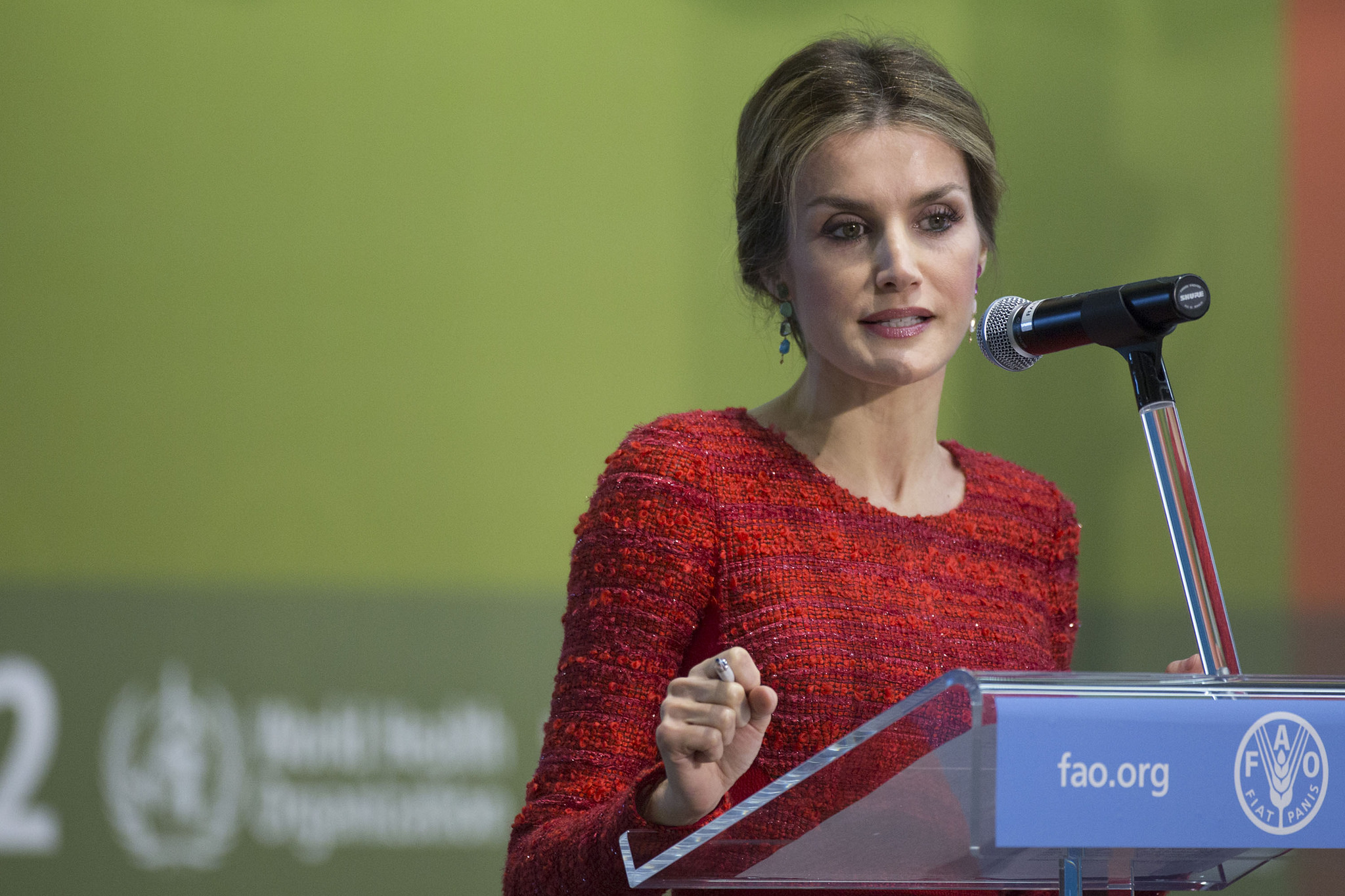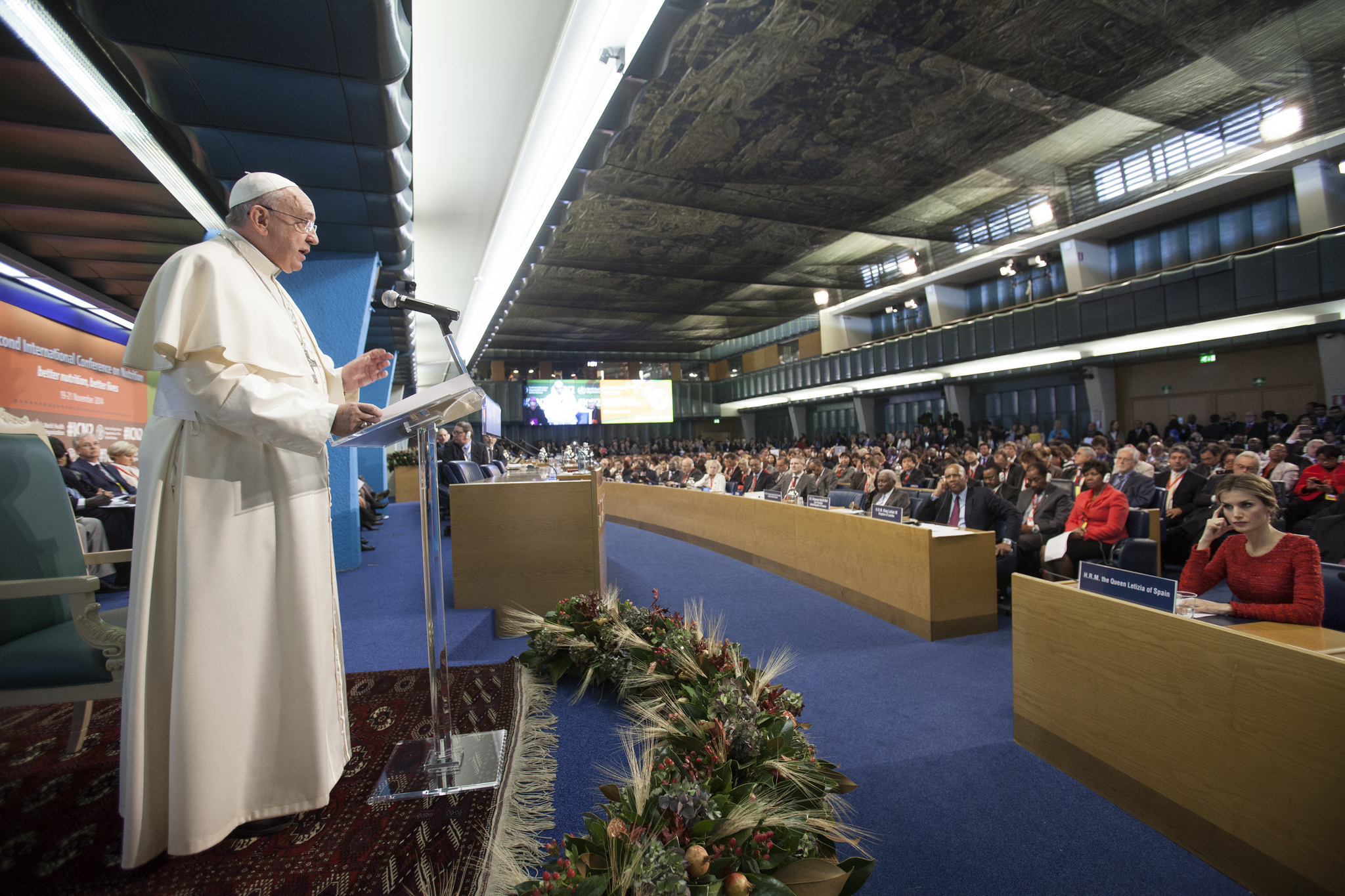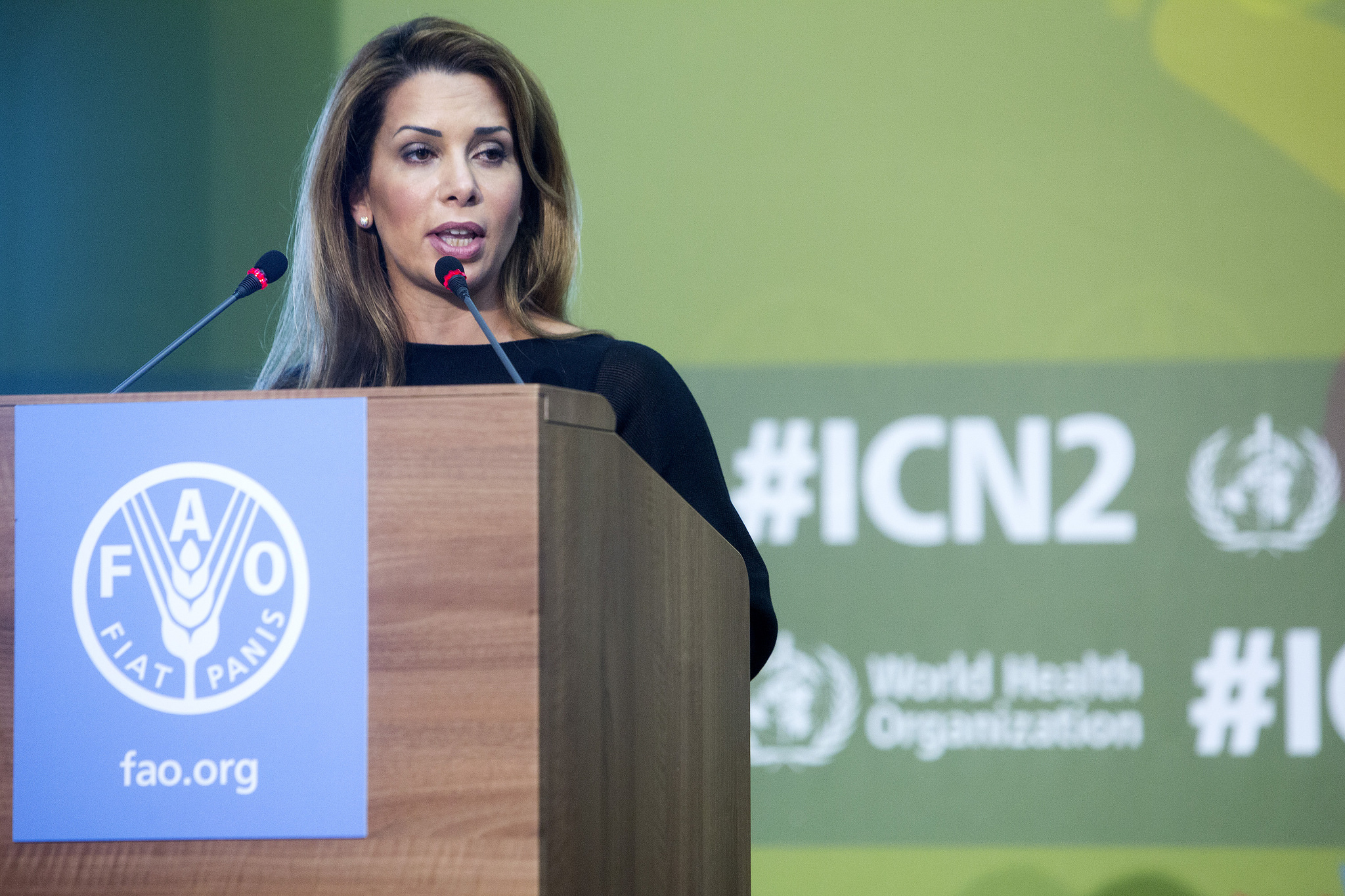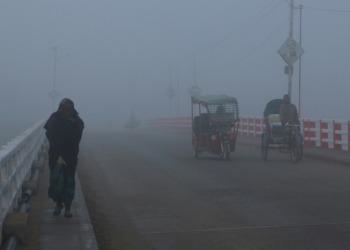ICN2 is not a new disease, it’s the bizarre acronym for the Second International Conference on Nutrition, held in Rome, 19-21 November 2014, at FAO Headquarters. Anyone familiar with the United Nations “alphabet soup” won’t be surprised. And in spite of this unpromising name, it drew over 2,200 participants, many from civil society, and delegations from over 170 countries, most of them headed by Ministers of Health – again, no surprise as the Conference was organized jointly by FAO and the World Health Organization.
It also drew the Pope, Queen Letizia of Spain, King Letsie III of Lesotho, Princess Haya Bint Al Hussein from the United Arab Emirates and Melinda Gates.
 In the photo: Queen Letizia of Spain – ©FAO/Alessandra Benedetti
In the photo: Queen Letizia of Spain – ©FAO/Alessandra Benedetti
Pope Francis made a memorable address (he spoke in Spanish) and was interrupted by applause several times. He told the Conference that access to food is a basic human right that shouldn’t be subject to market speculation. “We ask for dignity, not charity” he said, drawing applause. A little later, possibly deviating from his written text as he raised his eyes and spoke ex-tempore, he said, “God always forgives.” Then he paused, adding with a knowing smile, “Man forgives sometimes.” He paused again, looked around and finished, “but the Earth never forgives!”. He made it very clear: the Earth will not forgive the abuse of its resources for profit. This was also a dramatic and entirely new way to draw attention to an increasing issue and potentially a devastating one – the impact of Climate Change on nutrition – if we do nothing to “respect the Earth”.
Related articles : DIARY OF A UN OFFICIAL: MISSION #1 – MAURITANIA article by Claude Forthomme OIL SPILLS: A DOUBLE STANDARD WORLD article by Hannah Fisher-Lauder
No doubt about it, International Conferences on Nutrition seem to inspire Popes. At the first Conference, held in 1992, also in Rome and in FAO, another Pope made History: this was Pope John Paul II who used a phrase that became famous, the “paradox of plenty”, to decry a world of food abundance where the poor were denied access to food and died of hunger. And in that respect, as Pope Francis noted, little has changed. The poor are still denied access.
 In the photo: Address by His Holiness Pope Francis. Second International Conference on Nutrition (ICN2), FAO Headquarters (Plenary Hall) ©FAO/Giulio Napolitano
In the photo: Address by His Holiness Pope Francis. Second International Conference on Nutrition (ICN2), FAO Headquarters (Plenary Hall) ©FAO/Giulio Napolitano
The Conference also inspired princess Haya Bint Al Hussein to share her experience of visiting a hospital ward in Malawi and coming face to face with the drama of hunger. There, she witnessed the harrowing death of a tiny baby – the mother, emaciated herself after she had walked for days with her five children in search of food, was fondly cradling her in her arms. After the nurses had taken away the dead child, the princess asked the woman what was the baby’s name. “No name,” she answered, “when she was born, I knew she wouldn’t live so I didn’t give her a name…” That sentence shocked the audience and reminded us all that beyond the pretty words and the good intentions, lie real human suffering.
 In the photo: Princess Haya Bint Al Hussein of the United Arab Emirates. General Debate, Second International Conference on Nutrition (ICN2), FAO Headquarters (Plenary Hall). ©FAO/©Alessandra Benedetti
In the photo: Princess Haya Bint Al Hussein of the United Arab Emirates. General Debate, Second International Conference on Nutrition (ICN2), FAO Headquarters (Plenary Hall). ©FAO/©Alessandra Benedetti
The Conference was more than a string of well-intentioned words – billed as the first international conference to address the world’s nutrition problems in the 21st century, it reminded everyone that while progress has been made since the First Conference on Nutrition – we have now 805 million suffering from malnutrition, 209 less than we did 22 years ago, much still remains to be done.
The statistics are alarming:
- 161 million children under the age of five are stunted,
- 150 million are underweight and 40% of them suffer from acute malnutrition;
- 2 billion people suffer from one or more micronutrient deficiencies;
- 1.4 billion people are overweight, with 500 million obese.
Overweight and obesity claim the lives of 3.4 million people each year and the death of as many children is linked to malnutrition. Malnutrition does not stop at hunger, it impedes development and the full realization of our human potential – it perpetuates the cycle of poverty. Most of the world’s malnourished people are still in Southern Asia, followed by Sub-Saharan Africa:
What is required is concerted action across many sectors and disciplines to cover many areas: food safety and antimicrobial resistance; water, sanitation and hygiene; social protection; promotion of breastfeeding; ways to address stunting and wasting; childhood overweight and obesity; anaemia in women of reproductive age etc. As the Director General of FAO put it, “From any side you look at it, the price tag of malnutrition is too high. That is why we need ICN2 right now”.
The outlook however is not totally dire. In recent years, there has been a growing political commitment to address malnutrition, including the adherence of the international community to the 2012 World Health Assembly (WHA) targets and the launch of the UN Secretary General’s Zero Hunger Challenge; the €20 billion pledge in 2013 to the Global Nutrition for Growth Compact; and the acceleration of the Scaling Up Nutrition (SUN) movement, now joined by more than 50 countries.
The ICN2 produced two “outcome documents” (available here) that were unanimously adopted on the first day:
- the Rome Declaration on Nutrition that provides a “common vision for global action to end all forms of malnutrition” and expresses a “commitment to action”, including increasing investment and promoting collaboration within and across countries;
- the Framework for Action which is voluntary and makes 60 recommendations to all stakeholders, including governments, UN agencies and civil society, for implementing the Rome Declaration.
Both documents are intended to go to the United Nations General Assembly (UNGA) for endorsement. Reports on implementation and follow-up are to be compiled jointly by FAO and WHO and transmitted to UNGA.
In short, nutrition has become a matter of major concern in the international community.The intention is to include nutrition in the post-2015 Development Agenda of the United Nations. This, along with other key issues such as the right to food, were debated at the attendant three “roundtables” held in meeting rooms of FAO. The roundtables brought together conference participants with major actors, like Prof. Jeffrey Sachs, Director of the Earth Institute, Columbia University. He couldn’t attend the Conference in person but, in a long video address, he highlighted the fact that ICN2 should be viewed as a key step in the process of combating malnutrition; he also warned that more efforts should be made in data-gathering: he was concerned that there were still gaps in knowledge that could lead to wrong policies or the adoption of mistaken ones.
Still, the overall tone of the Conference was optimistic. Compared to the past, new issues have surfaced and there is a stronger sense of knowing where we are going and how to go about it:
- obesity is now a universally recognized problem; it affects primarily developed countries but the rest of world is not immune, as the delegate from Tunisia remarked;
- a rights approach to food is fully accepted and includes not only a “right to food” but related rights;
- empowering women – this is seen as fundamental and was (perhaps unsurprisingly) reflected in the very high number of female speakers at the Conference, more than half; nearly all the Ministers of Health present at the Conference were women, likewise the head of the World Health Organization, Dr. Margaret Chan;
- a strong link to climate change – it wasn’t something the Pope just said, everyone agreed that global warming constituted a real threat to food production
- political commitment accompanied by investment ; the EU indicated its strong commitment, and there was a general feeling that investment and willpower could go a long way to eradicate malnutrition once and for all.
As Melinda Gates reminded us in her address, nutrition has long been an “orphan issue” but now that we have global targets and national plans, and that NGOs are working together, we can expect amazing results, like the zero hunger campaign did in Brazil. And empowering women pays a double dividend: women farmers are key – often 40% of the total – and women are the ones who breastfeed.
 In the photo: FAO Director-General Jose’ Graziano Da Silva meeting with Ms Melinda Gates – Gates Foundation and Margaret Chan, Director-General, WHO. Second International Conference on Nutrition (ICN2), FAO Headquarters.©FAO/Giuseppe Carotenuto
In the photo: FAO Director-General Jose’ Graziano Da Silva meeting with Ms Melinda Gates – Gates Foundation and Margaret Chan, Director-General, WHO. Second International Conference on Nutrition (ICN2), FAO Headquarters.©FAO/Giuseppe Carotenuto
Hopefully, we will not have to wait another 22 years to give nutrition another push; and malnutrition will no longer be an issue while “nutrition for all” will have become a reality. Weather permitting…










